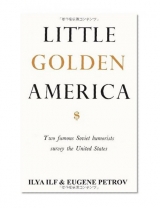
Текст книги "Little Golden America"
Автор книги: Евгений Петров
Соавторы: Илья Ильф
сообщить о нарушении
Текущая страница: 28 (всего у книги 28 страниц)
Besides automobiles, New York has still another frightful sovereign. He is Noise. Noise is manufactured here in enormous quantities. Underground bays the subway, overhead thunders the elevated railroad, hundreds of thousands of motors roar simultaneously on the streets. And at night, when the noise quiets down somewhat, one can distinctly hear the long and alarming sirens of the police, fire department, and gangster automobiles. The roar approaches, passes by, and is lost somewhere in the distance. Someone has been shot for love's sake, someone else out of hate, someone else simply for not sharing the spoils. Or maybe someone has hanged himself, or poisoned himself, or shot himself through his heart, unable to endure the life in the city of automobiles, noise, and headaches.
"Bromo-Seltzer," a drink for headaches, is sold everywhere, along with orange juice, coffee, and lemonade. Soon Bromo-Seltzer will find a place on the menu. The dinner will then be something like this: First, "Bromo-Seltzer"; in the second place, "chilli," which is a Mexican soup; in the third place, a fish called "sole"; and for dessert, again "Bromo-Seltzer." New York alone may have more telephones than all England, but undoubtedly in New York alone in the course of a day more headache powders are used than in all England in half a year. In the more quiet districts of New York apartments cost more, not because they are better, but because there is less noise there. In New York, quiet is an object of trade—and it is costly merchandise. It is in the same class with an English suit of clothes. It is expensive—but then, it is good.
In New York one can never be rid of a feeling of alarm. Down the busiest street there will suddenly drive an armoured bank car painted in bright red. The machine-guns of the armoured car are directed right at a crowd of young men in light hats who promenade with cigars in their teeth. Thus in New York money is transported. It can be carried only in armoured cars; otherwise, these same young men in light hats would make off with it. They seem to be smiling too suspiciously and anxiously, their hands in the pockets of their sleek overcoats.
It took us several days to bid farewell to our New York friends, streets, and skyscrapers.
On the day of our departure we went to Central Park West and up to the Adams's apartment. A Negress opened the door, disclosing shining African teeth that lighted up the vestibule.
In the dining-room we saw Mr. Adams pressing the baby to his chest. Beside him stood Mrs. Adams, who was saying:
"You have already held the baby for five minutes. It's my turn now!"
"No, no, Becky, don't talk like that! It hurts me to hear you talk like that."
On the table and on the floor lay unwrapped packages. Among the strings and wrapping paper lay a great variety of things: an old blanket, a plaid, binoculars, collars, several keys, with large hotel disks, and many other tilings.
"There, there, gentlemen!" said Mr. Adams, eagerly pressing our hands. "My things are beginning to come in little by little. All I have to do now is to return the keys to the various hotels and everything will be in order. Only my hat has not come yet."
"It would have been better to have got it in Washington, after all," Mrs. Adams said reprovingly, deftly taking the baby out of her husband's hands.
"But, Becky," Mr. Adams groaned, "you must not act like that! We have left instructions with the Washington post office to send the hat here. Let go of the baby! You have been holding her too long! It's harmful for the baby. Let her run around the room."
But scarcely had Mrs. Adams dropped the girl to the floor, when Mr. Adams with a cry caught the baby and pressed her to his chest.
A bell rang, and a postman came into the room with a package.
"This time it is the hat!" cried Mrs. Adams.
Yes, it was the hat. Mr. Adams solemnly pulled out of a box his old favourite hat and at once put it on his head.
"Let's go!" he cried in his ringing voice. "You are going away today, gentlemen, and until now you have not been on top of the Empire State Building! It would be foolish not to do that. If you want to know what America is, you must go up the Empire State Building!"
When the baby saw that her parents were again being led away by the unknown gentlemen who had already dragged them off for two months, 'she began to howl. She stamped her little feet and cried, tears flowing down her face, " No more trips!"
The parents swore to the baby that they were going away for only five minutes, but she continued to wail and to remind them that" that time they also said that they would go away for only five minutes and did not come back for a very long time."
We still heard the child's weeping while going down in the elevator. Papa and Mamma looked confused, but unquenchable curiosity lighted up their eyes.
"To go up the Empire State Building for the sixteenth time," muttered Mr. Adams, "is very, very interesting, gentlemen!"
For the last time we rode on top of a Fifth Avenue bus. Mannequins with pink ears looked at us out of the show windows. Between the automobiles passed three circus elephants who were inviting New Yorkers to visit an evening performance. Life proceeded apace.
We went to the top of the Empire State Building.
How many times, passing by, we could not contain ourselves, sighing and muttering: "Ah, the devil!—Well, well! That's something!" or words to that effect. Yet we went up only two hours before our departure from America!
The first elevator lifted us at once to the eighty-sixth story. The rise lasts only one minute. Naturally, one could not see here either stories or landings. We raced in a steel tube, and only the ears, which seemed to have filled with water, and a strange little chill around the region of the abdomen, made us aware of the fact that we were rising at an incredible rate of speed. The elevator did not clang or knock. It moved precipitately, smoothly, noiselessly. Only at the door tiny lamps flared, counting off tens of stories. At the eighty-sixth story landing we stepped out on somewhat weakened legs.
The second elevator brought the passengers to the roof of the building, and through large spyglasses we saw New York. It had snowed the day before. On the streets the snow had already melted. But on the flat roofs of the skyscrapers it still lay in pure, delicate white squares. The mountain air at the top of the buildings kept the snow from melting. An incredible city, winged with the comb of piers, lay below. The grey winter air was slightly golden from the sun. Over the black narrow streets crept tiny automobiles and the trains of the elevated railroad. The noise of the city reached here but faintly. One could not even hear the baying of the police sirens. All around, out of the midday twilight of the New York streets proudly rose the skyscrapers, their countless windows gleaming. They stood like the guards of the city, armed with glittering steel. At the pier of the Cunard-White Star Line could be seen a steamship with three stacks. The stacks were yellow, with black rings. That was the Majestic. Fifty-six thousand tons of steel, wood, rugs, and mirrors—the English steamer on which we were to depart that day. Yet, how small and helpless it seemed from the roof of the Empire State Building!
Two hours later we were on the steamer. The Majestic was making its last trip. After that this steamer, quite young yet, will be junked.1 With the appearance of the Normandie and the Queen Mary, new colossal Atlantic steamers, the Majestic was too modest and too slow-moving, although it crosses the ocean in excellent time—six days.
The huge bulk of the Majestic had already left the walls of the pier, and we heard for the last time:
"Good-bye, gentlemen! Seriously, I hope that you have understood what America is!"
And over the heads of the people at the pier frantically waved the trusty old hat of Mr. Adams and the handkerchief of his wife, the manly driver, who twice drove us across the entire continent, the never tiring, patient, ideal fellow traveller of the road.
When the Majestic sailed past Wall Street, darkness fell and lights appeared in the skyscrapers. In those windows gleamed the gold of electricity, but perhaps also real gold. This last golden vision of America escorted us to the very egress into the ocean.
The Majestic gathered speed. The farewell light of a buoy flashed by, and a few hours later there was not a trace left of America. The cold January wind blew a large ocean wave.
1 The Majestic was overhauled, and on April 23, 1937, it was launched as H.M.S. Caledonia, a training ship of the British Royal Navy. – C. M.








